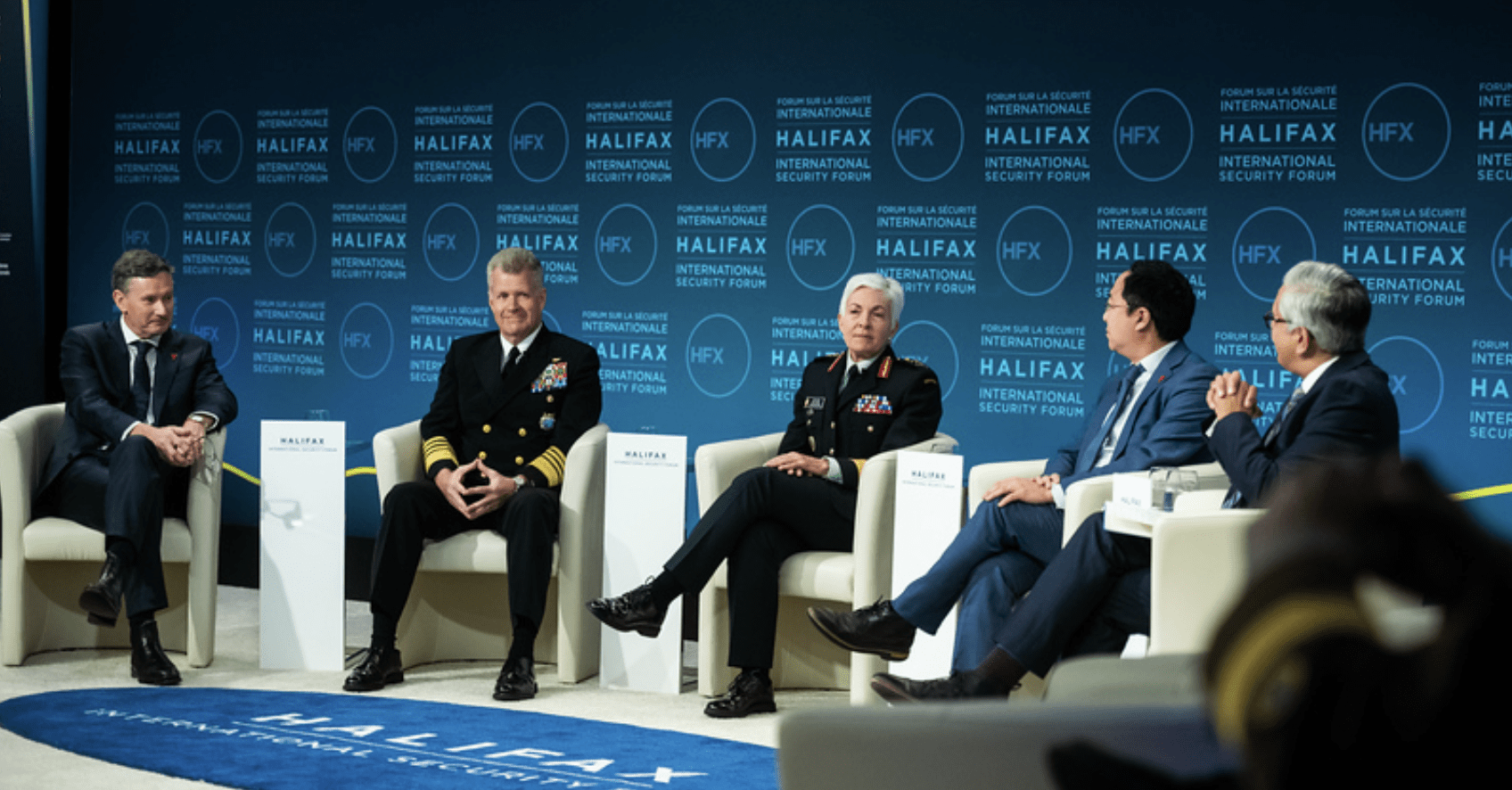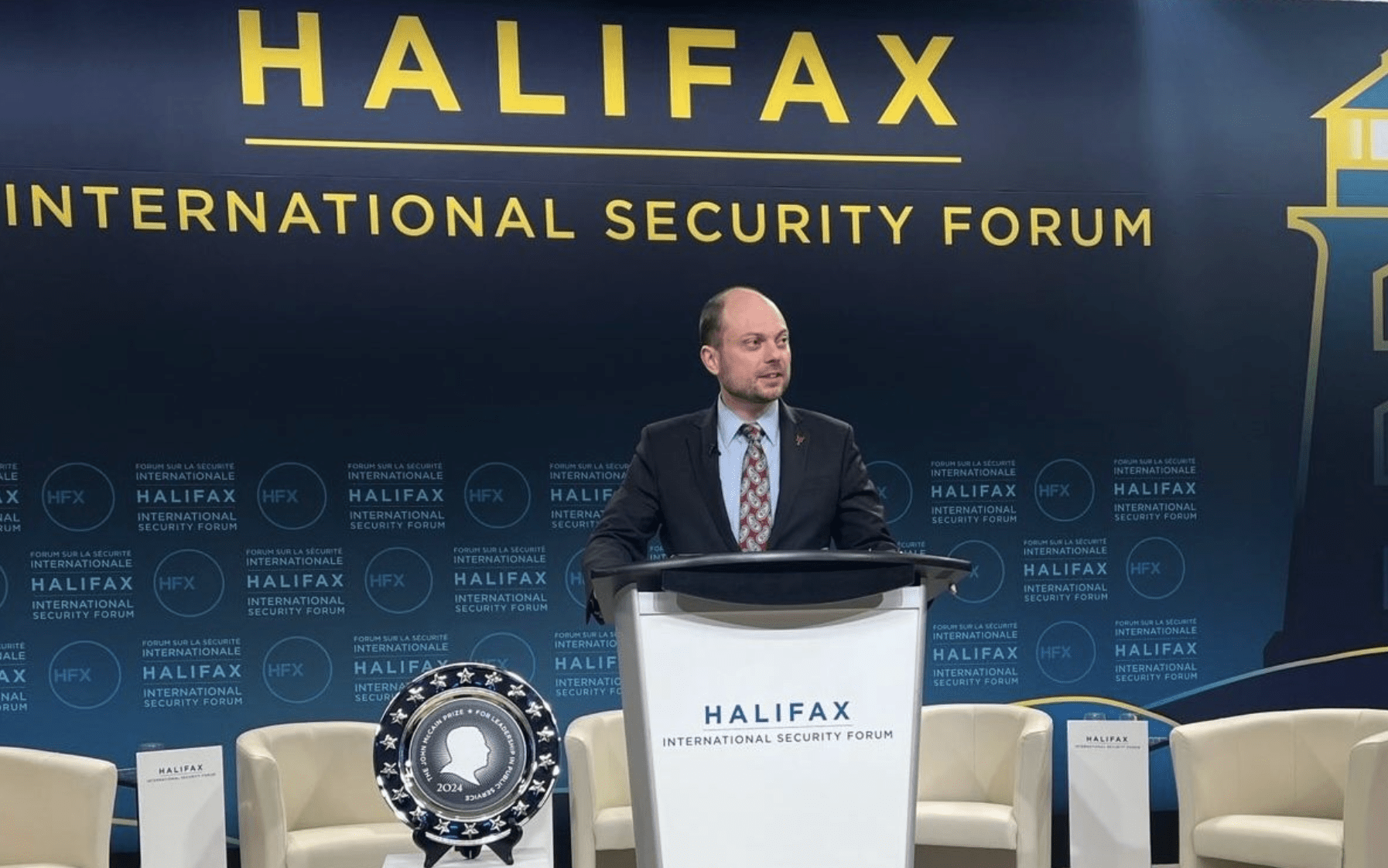Bracing for Trump II: Takeaways from the 2024 HFX
 Chief of the Defence Staff Jennie Carignan (centre) at HFX 2024/Halifax Security Forum
Chief of the Defence Staff Jennie Carignan (centre) at HFX 2024/Halifax Security Forum
By Colin Robertson
December 17, 2024
For more than a decade, the Halifax International Security Forum has served as not just a meeting of minds, but as a barometer for the competing pressures impacting global security. This year’s was no different, particularly as it fell just weeks after a US presidential election more potentially disruptive than any in recent history, including Donald Trump’s first attempt on the soul of American democracy.
So, the mood at the 2024 HFX was sombre, subdued and wary.
Forum President Peter van Praagh set the tone for this year’s discussions when he warned that, “Without democracy, there is no real security.”
Three themes dominated this year’s discussions. In the plenary sessions, the focus first was on Russia’s ongoing war against Ukraine and then on China’s increasing threats to Taiwan. In the corridors, it was all about Trump and what his return as president will mean for collective security and the defence of democracy.
Russian advances in Ukraine and the escalation in warfare are grim realities. Ruslan Stefanchuk, Speaker of Ukraine’s parliament, warned us that without more arms and financial support from the West, Ukraine will not win the war. As van Praagh argued, every international issue whether in East Asia, the Middle East, Africa or Latin America “is linked to Ukraine’s victory over Putin’s Russia.”
It’s not just about political will, it’s also about money and the industrial capacity of the democracies to produce enough arms and war material. When it comes to long-term planning, democracies are at a disadvantage, although the Norwegian Foreign Minister pointed to the approval by their coalition of 12-year defence budgets to allow for long-term commitments.
Former Taiwan president Tsai Ing-wen, whose country endures daily incursions by the People’s Republic of China into Taiwanese air, sea and cyber-space, told us that Ukraine must be our first priority because if we fail Ukraine, Taiwan could be next. Taiwan has embraced a “porcupine strategy” to repel China, but it depends on US arms and deterrence.
In corridor and closed-door discussions, the wariness over what the return of Donald Trump will mean was palpable. While the isolationist Trump promises to end the Ukraine war in one day, the Americans – Democrat or Republican – who come to HFX are internationalists for whom Trump is an unpredictable disruptor. Their speculation about what Trump 2.0 means was just that, as the world awaits his inauguration.
Listen to Colin Robertson’s Global Exchange podcast episode on HFX 2024, with Darrel Bricker of IPSOS, CGAI’s Ian Brodie and Politico’s Luisa Ch. Savage:
What is flooding back via the continuing tempo of daily tweets and transition nominations after four years of a “normal” US president in Joe Biden is that Trump does not subscribe to the traditional role espoused by US presidents.
Despite differences in style and politics, presidents from Franklin Roosevelt to Biden favoured investment in multinational institutions, world-wide security alliances, arms control agreements with adversaries, openness to trade and commerce, and support for promoting democracy and human rights. At the end of the day, they were prepared to carry and pay a disproportionate share. Such was the burden of primacy.
But not Donald Trump. Trump has portrayed the underpinnings of America’s superpower status as a raw deal for Americans that he is determined to fix as quickly as he can. In Trump’s worldview, which aligns with his support for autocrats, allies are a bunch of freeloaders. Trade does nothing but take jobs from Americans. And so, we are back to ‘Tariff Man’, the transactional dealmaker brandishing the threat of trade wars with a nexus of intersection on defence spending, China, technology and the other things Trump wants.
To reshore jobs and give tax relief, Trump needs revenue. This starts with tariffs on America’s three biggest trading partners: Mexico, Canada and China. The Europeans know they are next.
For now, there is no unified strategy on how to deal with Trump, either within or among the allies. In other times, in their role as G7 host and chair, Brian Mulroney or Jean Chretien would have made their priority the shoring up of their collective economies as the best defence of their democracies. Will Justin Trudeau do so at Kananaskis next year?
As Trudeau learned when he hosted the Charlevoix G7 summit, Donald Trump will disrupt if he so chooses. But the rest of the G7 needs to stand together if they are to defend both their interests and their values.
HFX is successful because it blends policymakers, policy analysts and policy activists with legislators, members of the armed forces, business and civil society. The common denominator is a shared commitment to democracy and a robust belief in deterrence through collective security.
 Vladimir Kara-Murza accepting the McCain Prize for Leadership in Public Service
Vladimir Kara-Murza accepting the McCain Prize for Leadership in Public Service
Last year, HFX came up with the moniker the CRINKs, to describe the growing complicity between China, Russia, Iran, and North Korea. Once seen as disparate points of conflict, the CRINKs are now recognized in the Biden administration’s new national security memorandum arguing for improved interagency cooperation; information-sharing with allies; calibrating economic tools, including sanctions, for maximum effectiveness; and bolstering preparation to manage simultaneous crises.
A hallmark of HFX is the congressional delegation, the enduring legacy of the late Senator John McCain, in whose name is awarded the annual leadership prize in public service. This year they went to Tsai Ing-Wen and recently released Russian dissident Vladimir Kara-Murza.
McCain convinced his colleagues that HFX, as the only defence forum of and for democracies, mattered. It now draws more members of Congress than any other event hosted in Canada. It is complemented by the always-impressive US Forces leadership that this year included Indo-Pacific Command, the Coast Guard and Space Operations. They, in turn, help to draw the Beltway community of think-tankers, journalists and others that give HFX the feel of ‘Potomac on Bedford Basin’.
This year’s congressional delegation was led, once again, by senators Jeanne Shaheen (D-NH) and Jim Risch (R-ID) with colleagues Amy Klobuchar (D-MN) Tim Kaine (D-Va), Mike Rounds (R-SD), and Representative and Senator-elect Andy Kim (D-NJ).
Risch and Shaheen will likely become, respectively, ranking member and chair of the Foreign Relations committee when the new Congress convenes in January. Risch said the committee would quickly approve the nomination of fellow senator Marco Rubio (R-FL) as the next Secretary of State. He was more circumspect about other cabinet nominees,.
Asked about Defense Secretary nominee Pete Hegseth’s comments about women in combat roles, Risch told us that “It’s delusional for anybody to not agree that women in combat creates certain unique situations that have to be dealt with.” That drew a sharp rebuke from Canadian Chief of Defence Staff Jennie Carignan. “I wouldn’t want anyone to leave this forum with this idea that women are a distraction to defense and national security.” The audience gave her a standing ovation.
But, there was no ovation for Canada’s defence posture.
If there was a fourth theme to this year’s conference it was the allies’ conviction, expressed in corridor and panel remarks, that Canada should pay its fair share for collective defence. For many of them, especially those on the eastern and northern frontier with Russia, two percent is just the floor. They project or now budget future spending at three, four and even five percent.
We may enjoy our GST rebates and generous social justice system but, as the prime minister acknowledged, affordability depends on security.
For Canadian defence ministers, HFX is a forum in which to assess the current threat environment. Bill Blair reiterated key points and changes contained in Our North, Strong and Free: A Renewed Vision for Canada’s Defence. He also announced that Canada and Australia will collaborate on research to understand emerging missile threats through joint development of detection, monitoring, targeting and counter-measure technologies.
Blair admitted that Canada needs to move more quickly to meet the NATO commitment to spend two percent on defence and, at the CGAI procurement conference two days later, added that Canada must take on a larger role in integrated continental air defence and coastline patrols as well as advance “procurement reform initiatives”.
As a starting point, Blair and his fellow parliamentarians should take heed of the recent Business Council of Canada call for a 3% spending target in its Security & Prosperity: The Economic Case for a Defence Industrial Base Strategy.
Participating in an HFX panel on Ukraine, Foreign Minister Mélanie Joly endured a roasting from moderator and former grand chess master, Garry Kasparov, on Canada’s inability to match performance to promises. An uncomfortable Joly said that she shares Blair’s sense of urgency on increasing defence spending.
At the NATO parliamentarians’ assembly in Montreal the day after HFX, Prime Minister Justin Trudeau acknowledged that you could not have affordability without security. Despite the fall economic statement’s $61.9 billion deficit, there was no new money allocated to defence spending. There was only a reiteration of past promises declaring the government is “focused on meeting our commitments…to our NATO allies” by building up “our own military industrial capacity”. But when will words translate into action?
And, the final takeaway from HFX: deterrence on the cheap no longer works. We may enjoy our GST rebates and generous social justice system but, as the prime minister acknowledged, affordability depends on security.
In the emerging world order, the force of the norms and rules we took for granted will depend on hard power. We pride ourselves on our soft power but even that is no longer up to snuff. Meanwhile, industry remains frustrated by tepid government commitment and a procurement system that is not moving at a pace or focus necessary to get basic supplies out the door.
If we want to play in the emerging game of thrones, it means real commitments and then rapid delivery on the capacities ensuring our national security, continental security and collective security.
Contributing Writer Colin Robertson, a former career diplomat, is a fellow and host of the Global Exchange podcast with the Canadian Global Affairs Institute in Ottawa.
